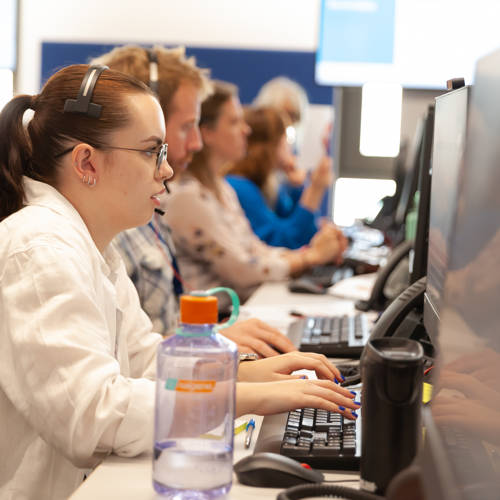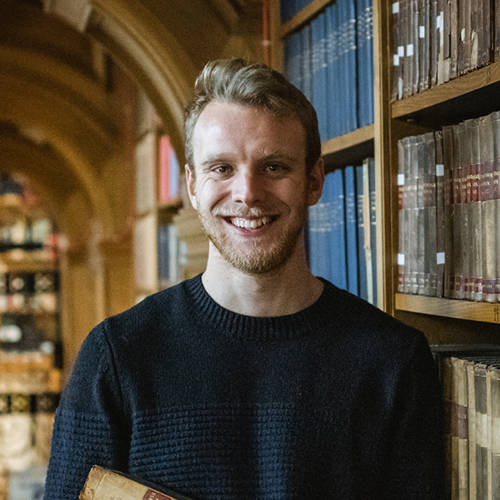Overview
Get ready with a foundation year and learn the foundational skills and knowledge to complete a full Honours degree. You'll be able to embark on this qualification without meeting the level 3 entry requirements, giving you the opportunity to study at degree level through this four year course.
Kickstart your career as a sports therapist with a BSc Sport Therapy and Rehabilitation degree from CCCU.
What you’ll learn
- Become an expert in BASRaT’s key competencies.
- Get hands-on experience throughout the degree as you help people recover through rehab and therapy.
- Support sports teams and individual athletes through our STaR Clinic to improve performance and stay injury-free.
- Prepare for roles in sport, healthcare, private clinics, or the NHS.
What’s more, you’ll have the chance to get involved in major sporting events like the London Marathon, Canterbury and Whitstable Runs, and the Brighton Marathon. These events will give you invaluable experience, helping you develop your skills in real-world settings.
Taking a person-centred, holistic approach, you'll become a well-rounded graduate who is able to critically think, collaborate, and reflect on your own practice. With these skills, you'll continue to evolve as a sports rehabilitator as you make informed, research-backed decisions.
If you’re looking for an accredited and practical sports therapy degree that will set you up for employment upon graduation, then apply to study at CCCU.
We know employers are looking for dynamic, open-minded graduates who can adapt, innovate, and collaborate. So, we have designed a new way of teaching and learning to ensure that you are work-ready for when you graduate.
Top 10 in the UK
for the satisfaction with teaching in the subject area of Sports Science.
The Guardian University Guide 2026
Why study Sports Therapy & Rehabilitation at CCCU?
- Select your qualification
- Select your grade
- Add it and repeat
Accepted qualifications
We accept a wide range of general qualifications that attract UCAS Tariff points either on their own or in combination with others. Below are some common examples.
| Qualification | Grades |
|---|---|
| A Levels | DDE |
| BTEC | MPP |
| Access | Pass 45 Credits |
| International Baccalaureate | TBC |
Applicants without formal level 3 qualifications will also be considered.
DBS requirements
A current satisfactory Disclosure and Barring Service (DBS) check will be required. Where you do not already have this you can apply for this check through the University. For more information please see CCCU DBS requirements .
It is a condition of registration on any course requiring a satisfactory check from DBS that the student maintains good standing in relation to their behaviour and, where required, subscribes to the criminal record status check service.
It is also a condition of registration that prospective students undertake an Occupation Health screen to ensure that they are fit to practice. This online health screen establishes your vaccination status and boosters may be offered if needed in readiness for any NHS placements. Further information about the Occupational Health Screen can be found on our website.
More information
Contact us
Module information
Core/optional modules
How you’ll learn
In your Foundation Year, you will be introduced to higher education with a range of supportive modules that prepare you for study in higher education and familiarise you with the core knowledge and skills of your chosen subject.
We use a style of teaching called blended learning. In this approach to learning we mix up and combine theory and practice in lectures, seminars, practical sessions, labs, workshops and tutorials.
Seminars and tutorials in smaller groups will enable you to discuss and develop your understanding of topics covered in lectures and other sessions. We also chunk up our teaching into bite size chunks so you can have a regular breaks to help your concentration. (Pomodoro Technique)
Our group teaching for practical learning is delivered in a 1:20 ratio (1 teacher working with 10 pairs of students, who practice together). In our on-site clinic is a 1:10 ratio (1 clinical educator supervision 4 pairs of student practitioners working with patients) offering you the best small group learning opportunities.
In addition, you will meet with your personal academic tutor on a regular basis, and we offer an online diary so you can book a variety of appointments with the course lead or module leads.
Most modules carry with them a digital workbook or written report which will require independent study to complete and this study time is built into each module.
Independent study is an important component of applying the theory and practice learned in contact time to build confidence and competency in the required skills necessary for successful practice as a graduate sports rehabilitator.
Your teaching staff will signpost you on how best to utilise this self-directed learning, in terms of pre-reading/pre-watching and self-practice to support skill acquisition, competency building and professional development.
During each semester you will normally study three modules, so each module will have a 10-12 hour commitment per week.
Your overall workload in year 1 of the course typically consists of 10-14 contact hours per week.
In year 2, again typically you can expect to undertake 14 hours contact per week in Blended learning sessions and practical application.
Year 3, sees you engaged in 14-17 contact per week which includes an expectation that you will participate in our onsite teaching clinic 1 day a week, and external placement, contributing to your 400 hours of experiential learning.
Where possible, we try to compact your uni week, timetable permitting of course, allowing you an opportunity to get paid work two days a week.
The teaching team consists of highly qualified academics (some are still active in the sports rehabilitatioan industry), supported by a skilled technical team.
They have a range of expertise and experience across the across the breadth of disciplines studied on this course.
Most staff hold the highest academic qualification (doctorate), with a small number of staff working towards achieving this standard or fellowship of the Advanced HE.
Staff are research-active and many of the teaching team are at the forefront of their research fields in the UK and beyond. They have substantial experience in delivering research led and research informed teaching.
Postgraduate students sometimes assist in teaching and assessing some modules. However, experienced academics teach most lectures and seminars.
Sports Rehabilitation requires a hands on, holistic, and evidence based approach to managing the injured individual. It would make sense therefore, to teach, and learn these skills in a practical, “hands on” and applied way!Colm GregoryCourse Director
How you’ll be assessed
The course provides you with opportunities to test your understanding of the subject informally before you complete the formal assessments that count towards your final mark. Practical sessions will also allow students to receive feedback on their engagement and progress throughout the course.
There is a formal or 'summative' assessment at the end of each module. Assessment methods may include written examinations, presentations, practical treatment sessions and a range of coursework assessments such as essays, reports, portfolios, and your final year major project. The grades from formal assessments count towards your module mark.
Most of our modules are assessed using 2 elements, Observer Structured Clinical Examinations (OSCE) or Observed Structured Practical Examinations (OSPE,) and a Digital Portfolio Workbook element. OSCE/OSPE style exams simulate practice life and are designed to test the acquisition of key professional competencies required as a sports rehabilitator. Digital workbooks to evidence of the acquisition of key practical skills and clinical competency normally in a video format.
Special regulations are associated with the assessment of our course of study can be found here. Additional Course Regulations
Your future career
Our degree can open up roles in a number of different areas. Examples of careers you can pursue with a Sports Therapy & Rehabilitation degree include:
- Sport rehabilitator or therapist in both sport and clinical settings
- Strength, conditioning, fitness and wellbeing advisory work
- Health screening and prevention roles (e.g. fall prevention, pre-obesity/pre-diabetic populations).
Alternatively, the course will offer you the option to continue in further education at the MSc, MRes or PhD level.
This course exceeds expectation, it is packed full of knowledge, hands-on practice and real-world case studies that will allow me to have a strong basis for my future in this profession. The lecturers' endless experience and personalised support are invaluable.HollyStudent
Related courses
Fees
Tuition Fees for 2026/27 have not yet been finalised. These course web pages will be updated with Tuition Fee information once they have been agreed.
- Read advice about funding your degree
- See information about the financial support available for undergraduate studies
- If you would like information about paying your fees, please contact accounts.receivable@canterbury.ac.uk
- For specific fee queries, please contact fees@canterbury.ac.uk
As an emerging healthcare profession, our course is accredited by the British Association of Sports Rehabilitators and Trainers (BASRaT). On graduating from this degree course, with the required experiential learning (400 placement hours) and being of good character and good health (fitness to practice), graduates will be eligible for membership to the register of Graduate Sport Rehabilitators (GSR) held by BASRaT.
As part of the accreditation process students embarking on this course of study must meet the conditions of any offer by undertaking a Disclosing and Baring Service enhanced check and an Occupation Health Screening (fitness to practice).
We also have special regulations associated with the course that students are required to comply with, in order to be eligible to entry to the BASRaT register on graduating.
Regulated by the Office for Students
The Office for Students (OfS) regulates Canterbury Christ Church University. The OfS is the independent regulator of higher education in England. It aims to ensure that every student, whatever their background, has a fulfilling experience of higher education that enriches their lives and careers. Further details about its work are available on the OfS website.
Apply now
Find out more
Sign up to hear the latest from the University, including upcoming events, useful updates, student life and more!
*We are advertising this course as ‘subject to approval.’ When we add new courses or update existing courses, we advertise the course as ‘subject to approval’. We do this to let you know the University still needs to agree to run the course. It is rare for a course not to gain approval, but it is not guaranteed. There may be changes to course and module titles, content and assessment, but we will tell you about these if there is a change. You can still apply to study a course subject to approval. We have prepared some questions and answers to tell you more.





